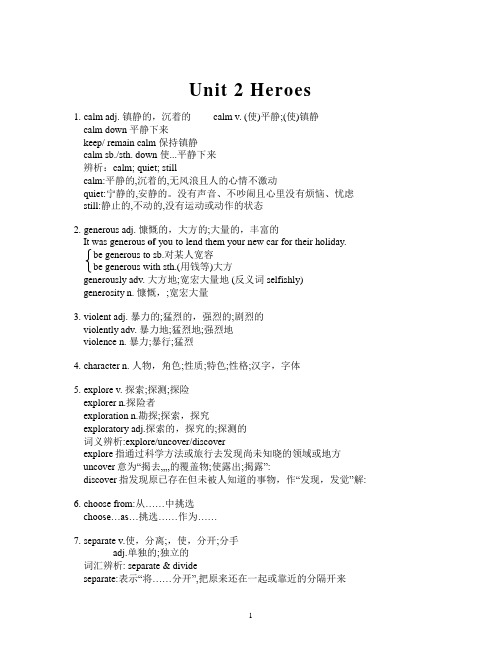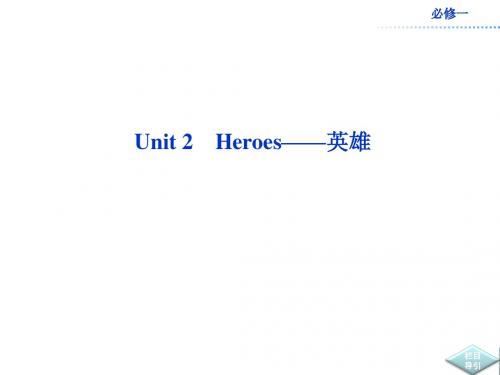XX届高考英语语法专题复习Unit 2 Heroes语法剖析
高考英语总复习Unit2Heroes北师大版

-2-
主题语境:人物介绍
-3-
高频单词 重点短语 难点句型
1.calm adj.镇静的,沉着的 v.使安静,使镇静
[高考佳句] ①I placed the chick in the nest,and it
quickly calmed down
.
我把小鸡放到窝里,它很快就安静了下来。(2017·全国Ⅰ卷,
shake/rock the foundations of从根本上动摇
-9-
高频单词 重点短语 难点句型
四维热练
(1)用found的恰当形式填空
② Founded in Moscow after the 1905 revolution,the
company eventually settled in Tel Aviv in the late
digging icnhtaoratchters
we were going to play.
我们尊重工艺,专注于挖掘我们要扮演的角色。(2017·全国Ⅱ
卷,阅读理解B篇)
be different in character有着不同的特性
a leading character主角
out of character不符合某人的性格,和……不相称
[高考佳句]①One of the most famous theatres in
Georgia,the Mafrojuanndiesdhvili,
in 1928,appears
regularly at theatre festivals all over the world.
格鲁吉亚最著名的剧院之一Marjanishvili建立于1928年,经常
2019-2020年高中英语模块Unit2Heroes单元知识要点北师大版必修1

2019-2020年高中英语模块Unit 2 Heroes单元知识要点北师大版必修1一、重点短语1.因…而文明:be famous for作为…而文明:be famous as2.升空:lift oft3.与…脱离:separate from4.因为,由于:because of5.释放:let out sth6.探索太空:explore space7.完成任务:plete a task8.表达愿望:express wishes9.成百万的:millions of10.向….挥手:wave to sb11.正在做…突然:be doing sth...when12.在我看来:in my opinion13.获得诺贝尔:win / receive the nobel peace peize14.做演讲:make a speech /speeches15.为…而战:fight for和…一起作战:fight with为...反对...而战:fight against16.充满:be full of17.讲述:speak about18.回顾:look back19.与...竞赛:pete against / with20.对某人要求严格:be strict with sb对某事要求严格:be strict in sth21.结束:e to an end22.表达对....兴趣: express a keen interest in23.成功的道路:the road to success24.渴望做…:be keen to do25.从马上摔下来:fall from the horse26.单独的,靠自己:on one,s own27.募捐了很多钱:raise a lot of money28.放弃:give up向某人屈服:give in to sb29.度过难关:pull through30.为…感到抱歉:fell sorry for.31.自杀:mit suicide32.与....相处:get on well with33.参力口: get involved with34.考虑:think of …35.太:far too36.坐牢:in prison上大学:at college37.取得令人惊奇的进步make amazing progress38.吸引某人的注意力draw attention to....39.达到某种程度e to40.因….而钦佩admire sb for sth二、重点语法时态:1 一般过去时态2过去进行时态3现在完成时态三、书面表达A story2019—2020年高中英语模块一 2单元wele-word power教案(牛津版Teaching objectives:♦To introduce and develop the theme of growing pains.♦To develop speaking ability by talking about families and problems that happen between teenagers and parents.♦To know more about classmates and their families.Important and difficult points:♦Get students to understand what growing pains means.♦Make students know the relationship between parents and their teenage children in the USA.♦Help students to form a positive attitude towards relationships between their parents and them.Teaching procedures:Step 1 lead-inGet the students to read the two passages in the lead-learning paper and have a general idea of “growing pains”KEYS: CBAAD, ABBACThen ask the students the following questions:What are Growing pains?When do we probably have growing pains?step 2 Picture discussionAsk Ss to look at the pictures and discuss each picture in groups of four.Picture 1What does the boy do?What is the mother doing? How is she probably feeling?What feelings may the boy have?Picture 2What happens to the girl with a bag?What did her parents ask her to do?Can you guess what might have happened to her?What will she do?Picture 3Why are the boys and girls around the pretty lady?What does the boy want to do? Is he allowed to do so? Why or why not?What feelings may the boy have?Picture 4What is the boy probably doing?Did the boy do well in his exams?How does his mother feel about the score?What feelings may the boy have?Get several students to talk about the pictures.Step 3 Picture DescriptionImagine the situations and try to describe each picture as fully as possible with their own words. Make sure that Ss have “when”, “where”, “who”, “what” in your descriptions.Invite some Ss to report back their descriptions.Step4 FurtherDiscussionDiscuss the following questions in groups of four.When you have a problem and want to talk to someone, who do you choose to talk to?Do you think you understand your parents?Tell the students ways to solve generation gap between their parents and them.Do spend some time talking with your parents, and you will find your parents have the same interests as you.When your parents don't understand you, please try to think from保度)ang f. y s ur parents.Further discussion:Do you think there is a generation gap between you and your parents? If so, what is the best way to solve the problem?Consolidation:Generation gaps happen a lot. But sometimes a smile, a walk, a gift, a letter or a talk can solve the problems. Do remember that your parents love you and sooner or later you will bee parent, too. So be kind to your parents and try your best to understand them. Understanding is a bridge over the gap. Homework:1Preview the Reading part.2Write a short passage about an unpleasant experience with your parents/friends/teachers.Period 2 Reading 1(prehension focus)Teaching objectives:♦To develop students’ ability of reading a play♦To know about American family life and problems that happen between American teenagers and their parents♦To form a positive attitude towards solving problems between teenagers and parents Important and difficult points:Learn to analyze the emotions of each character from the instructions of the play.Teaching procedures:Step 1 Lead-in:Get students to think about the following questions:Have you ever watched the famous American film “Home alone”?Could you give a brief introduction of the film?If you were left alone, can you imagine what might happen?Step 2 readingPlease go through the Reading strategy and tell me how to read a play.(make sure students know how to read a play.)First reading:Get students to read the play and finish Part A individually.Answers1.Eric,Daniel, Mom and Dad.2.The room was a mess./ There was trash all over the place.3.Spot was ill.Second readingReread the play and finish PART C1and C2Detailed readingStep 3:Role-playDivide students into groups of five and one is the narrator and the others are the main characters. Role-play Act One and Act Two.Step 4:Consolidation1. Choose the best answers according to the play(见同步导学P41Ex1)2plete the task-based reading(见学英语报第四期B2 版REDING)Step 5:Discussion1.Suppose you were one of the children what would you do?2.How do you think good parents should treat their children?3.Do you think there is a generation gap between you and your family? How can you deal with it? Homework:1.Write an end to the play.2.Role-play the dialogue in groups of five. And preview the language points in the article.Period 3 Reading 2(Word Focus)Teaching objectives:To learn new words and expressions and learn how to use them..Important and difficult points:The usage of: “expect, be supposed to do sth, go unpunished, leave sb in charge, to have sth. done, should have done”Teaching procedures:Step 1 Revision1.Ask two students to read their writings.2.Get students to look at Part E .First fill in the blanks and then pare their writings with theconversation.Step 2 Focuses in the texts:Go through the passage with the whole class and deal with some language points with them.一、Some phrases:1.嘭地关上门2.以对话的形式3.恶劣行为4.弯下身去摸那条狗5.朝某人叫嚷6.行为举止像大人一样7.注意说明8.没有受到惩罚9.描述一次不愉快的经历10.环顾四周11. turn up music 12. a waste of time 13. force to do something.14.deserve to know the truth 15. be angry with somebody16.be hard on somebody 17. argue with somebody about something18. leave you in charge 19. expect good decisions from you20. earlier than expected二、Useful drills1. Mom and Dad arrived back from vacation a day earlier than expected. (page 22, line 2)爸爸和妈妈外出度假,比孩子们预计的时间提前一天返回家中。
高考英语一轮复习提能练二Unit2Heroes含解析北师大版

Unit 2 Heroes第一部分阅读理解(共两节,满分40分)第一节(共15小题;每小题2分,满分30分)阅读下列短文,从每题所给的A、B、C和D四个选项中,选出最佳选项。
A(2021·广州市高三年级阶段训练)语篇解读:本文介绍了书虫文化寄宿计划的相关情况,包括该计划的意义、申请人的条件以及享受的待遇等。
1.Why would a homestay family probably want to take part in this program ?A.They are eager to share their interests.B.They are paid to do so by the company.C.They wish to travel to other countries later.D.They want their own children to learn English.D[推理判断题。
根据方框中的“In return for teaching the family's children English...to experience the local language and culture”可知,作为对每天教寄宿家庭的孩子大约2小时英语的回报,你将有机会体验当地的语言和文化。
据此可以推知,寄宿家庭想参加这个计划的原因可能是想让他们的孩子学英语,故D项正确。
] 2.Who CANNOT take part in the program as a homestay visitor?A.Someone who already speaks an Asian language.B.A student that has taken part in the program before.C.A 24yearold middle school English teacher from the UK.D.A student born in a nonEnglish language speaking country.C[细节理解题。
Unit2Heros语法北师大1.doc

高一英语【北师大版】必修一语法(1)现在分词与过去分词作状语的区别。
现在分词做状语与过去分词做状语的最主要区别在于两者与所修饰的主语的主动与被动关系的区别。
1)现在分词作状语时,现在分词的动作就是句子主语的动作,它们之间的关系是主动关系。
He went out ,shutting the door behind him.他出去后将门随手关上。
Not knowing what to do, he went to his parents for help.由于不知如何办是好,他去找父母帮忙。
2)过去分词作状语时,过去分词表示的动作是句子主语承受的动作,它们之间的关系是被动关系。
Given more attention, the trees could have grown better.如果对这些树多关心一些,它们本来会长得更好。
Faced with difficulties, we must try to overcome them.在遇到困难的时候,我们必须设法克服。
Caught in a heavy rain, he was all wet.Given more encouragement, the boy could have behaved better2)分词作状语放在句子开头,除表示原因之外有时表示时间或条件。
动词不定式作状语时,除了表示目的以外,还表示结果或原因。
Reading attentively,he forgot the time for lunch.由于在专心读书,他忘了吃午饭的时间。
(原因)Reading carefully,he found something he had not known before.他仔细读书时,发现了一些从前不知道的东西。
(时间)Reading carefully,you'll learn something new.只要你仔细阅读,你会学到一些新的东西。
【K12学习】XX届高考英语轮Unit2Heroes单元精练复习教案

XX届高考英语轮Unit2Heroes单元精练复习教案知识清单重点单词1.________ad大方的;慷慨的→________n.慷慨;大方→________adv.慷慨地;大方地.________ad暴力的→________n.暴力.________vt.探险→________n.探险者→________n.探险;探测.________ad平等的→________adv.平等地.________ad卓越的;辉煌的→________adv.辉煌地→________n.卓越;辉煌6.________ad灵巧的;熟练地→________adv.灵巧地;熟练地→________n.技巧;技能.________vt.比赛;竞争→________n.比赛;竞争.________v.提升;促进→________n.提升;推广→________ad推销的.________ad自信的→________n.自信0.________n.伤害;损害→________vi.受伤;损害重点短语1.________________达到某种状态________________________在我看.________________放弃________________融洽相处;进展.________________太……;极为……________________________单独地;独自地.________________自杀________________________________结束.________________解脱;发出;泄露0.________________________盼望;期盼;期待1.________________________参加;参与________________恢复健康;渡过难关重点句式1.haterehelicoptersdoingasyangLieireturnedtothe_ear th's_atosphere?2.Patasinthebathrooithahairdryerinh erhandhensheheardacrash.3.I_have_a_drea_thatyfourl ittlechildrenillone_dayliveinanationheretheyillnotb ejudgedbythecolouroftheirsin,butbythecontentoftheir character.4.I'far_toobusyithlivingto_thin_ofgiving up!5.Ithought21hoursastoo_short_to_stayinspace.核心语法1.一般过去时和过去进行时.现在完成时自我校对重点单词:.generous;generousness;generously 2.violent;violence 3.explore;explorer;exploration4.equal;equally5.brilliant;brilliantly;brilliantness6.sillful;sillfully;sill7.pete;petition8.proote;prootion;prootional.confident;confidence 10.injury;injure重点短语:.eto 2.inyopinion 3.giveup 4.geton 5.fartoo 6.onone'son7.itsuicide8.etoanend9.letout 10.looforardto 11.getinvolvedith 12.pullthrough重点词汇探究.strugglevt.努力;抗争;挣扎n.斗争;挣扎struggleagainst/ith与……抗争struggletoone'sfeet挣扎着站起struggleithsb与某人搏斗strugglefor...为……而斗争)ItastheyearhenBritaindeclared________onGerany.那是英国对德国宣战的一年。
北师大版高中英语必修二Unit2Heroes知识点总结

Unit 2 Heroes1.calm adj. 镇静的,沉着的 calm v. (使)平静;(使)镇静calm down 平静下来keep/ remain calm 保持镇静calm sb./sth. down 使...平静下来辨析:calm; quiet; stillcalm:平静的,沉着的,无风浪且人的心情不激动quiet:宁静的,安静的。
没有声音、不吵闹且心里没有烦恼、忧虑still:静止的,不动的,没有运动或动作的状态2.generous adj. 慷慨的,大方的;大量的,丰富的It was generous of you to lend them your new car for their holiday.be generous to sb.对某人宽容be generous with sth.(用钱等)大方generously adv. 大方地;宽宏大量地 (反义词 selfishly)generosity n. 慷慨,;宽宏大量3.violent adj. 暴力的;猛烈的,强烈的;剧烈的violently adv. 暴力地;猛烈地;强烈地violence n. 暴力;暴行;猛烈4.character n. 人物,角色;性质;特色;性格;汉字,字体5.explore v. 探索;探测;探险explorer n.探险者exploration n.勘探;探索,探究exploratory adj.探索的,探究的;探测的词义辨析:explore/uncover/discoverexplore指通过科学方法或旅行去发现尚未知晓的领域或地方uncover意为“揭去……的覆盖物;使露出;揭露”:discover指发现原已存在但未被人知道的事物,作“发现,发觉”解: 6.choose from:从……中挑选choose…as…挑选……作为……7.separate v.使,分离;,使,分开;分手adj.单独的;独立的词汇辨析: separate & divideseparate:表示“将……分开”,把原来还在一起或靠近的分隔开来separate…from…把………分开divide:把某个整体划分为若干部分divide…into…把……分成……8.let out释放;泄露(秘密、消息等);发出let alone更不用说 let down使某人失落9.wave v.挥手 n.波浪,挥手wave at/to sb.向某人挥手wave sth. at sb.向某人挥动某物wave goodbye to sb.= wave sb. goodbye.向某人挥手告别10.hear of /about 听说hear from 收到某人来信11.humour n. 幽默感 a sense of humourhumorous adj. 幽默的12.honest adj. 诚实的 honesty n. 诚实13.peacefully adv. 和平地,爱好和平地;平静地,安静地peace n. 和平,宁静;平和 in peace 处于和平的状态;平静地peaceful adj. 和平的,爱好和平的;平静的14.found vt. 建立,创立,创办founder n. 创始人,奠基人foundation n. 基础;奠基;基金会辨析:found ; build; put up;set up; formfound 创建,建立(组织,机构,国家,学校等) found a institute 建立研究院build 建设,建造(具体的或抽象事物) build some hospitals 建一些医院put up 建造,搭起(建造高于地面的建筑物) put up a tent 搭起帐篷set up 开设,建立(生意,公司,公益医院) set up a flag 竖起旗帜form 构成,形成(关系网,观点,习惯等) form a habit/an opinion 养成习惯,形成观点15.equal adj. 相等的;平等的;胜任的 unequal 不平等的equal vt. 等于;比得上 n. 对手;相等的事物equality n. 平等;相等;胜任equally adv. 平等地;相等地;均等地be equal to (doing)sth. 等于;胜任(做)某事16.struggle vi. n. 搏斗;斗争;拼搏struggle against 为反对…而斗争struggle with 与…打架,与…斗争 / 在内心与(自己、自己的良心等)进行斗争struggle for 为…而斗争struggle to do sth.努力去做某亊struggle to one’s feet 挣扎着站起来词义辨析:struggle/fightstruggle/fight 两个词均有“战斗,战争”之意。
高考英语北师大版必修部分一轮复习课件Unit2Heroes英雄

栏目 导引
必修一
afterwards adv.后来,然后 5.__________ struggle 6. __________vi.& n.斗争 awful 7.__________ adj.糟的;可怕的 athlete 8.__________ n.运动员 disaster 9.__________ n.灾难;祸患
what to do next.
我想她该拿定主意下一步做什么了。
栏目 导引
必修一
基础盘点 • 自测自评
核心单词 equal 1.__________ adj.平等的
skillful 2.__________ adj.灵巧的,熟练的 admire 3.__________ vt.钦佩,羡慕 generous adj.慷慨的,大方的 4.__________
been there.Alan谈起罗马来就好像他
去过那里似的。
栏目 导引
必修一
3.“wish+宾语从句”,表示不大可能 实现的愿望。现在的愿望:主语+过去 时;过去的愿望:主语+had done; 将来的愿望:主语+would/could do
How I wish we students had more
况用过去时;表示过去的情况用过去完
成时)
栏目 导引
必修一
Our head teacher treats us as if we were her own children,so all the
students in our class think highly of
her. 班主任老师对待我们就像她自己的孩子 一样,因此,我班的同学对她评价很高。 Alan talked about Rome as if he had
高考英语一轮复习Unit2Heroes单元主题语篇训练三含解析北师大版必修

Unit 2 单元主题语篇训练Ⅰ.阅读理解AChina is a big country, and there is no simple answer to the question “When is the best time to visit China? ” There are two best times to visit China, depending on your preference.OctoberThings to do: hike on the Great Wall, photography tourPlaces to visit: Beijing, Xi'an, Shanghai, Guilin,Jiuzhaigou, ChengduThe best time to go to China is early autumn (October).Most of China has warm temperatures, and the summer rains have stopped (apart from around Hong Kong and Sanya) so it's pretty dry.The autumn colours are also amazing.It is quiet at tourist attractions for most of the month, as the summer holiday travel crowds have gone.But try to avoid October 1st -7th, which is the Chinese National Day holiday, as attractions, transport and hotels are packed with Chinese tourists and prices go up a lot.Late Spring (April to May)Things to do: appreciate flowers, Li River cruise, ethnic festivalsPlaces to visit: Beijing, Xi'an, Guilin, Huangshan, Guizhou, Zhangjiajie The secondbest t ime to travel to China is probably in April and May, when the flowers are in bloom and the temperatures are warming up.In late spring, temperatures across China are getting into the 20s (℃), except the extreme northwest and northeast.While the North of China is still dry, the summer rains have already begun in the South.This could actually improve the view in the form of mountain fog in mountainous areas like the Li River and the Yellow Mountains.Ethnic festivals in Guizhou are concentrated in April and May, such as the Sisters' Meal Festival.If you are interested in Miao and Dong ethnic cultures, this is a good time to visit.Travel prices are average: cheaper than June to October, but more expensive than the lower season from November to March.语篇解读:本文是一篇说明文。
- 1、下载文档前请自行甄别文档内容的完整性,平台不提供额外的编辑、内容补充、找答案等附加服务。
- 2、"仅部分预览"的文档,不可在线预览部分如存在完整性等问题,可反馈申请退款(可完整预览的文档不适用该条件!)。
- 3、如文档侵犯您的权益,请联系客服反馈,我们会尽快为您处理(人工客服工作时间:9:00-18:30)。
XX届高考英语语法专题复习Unit 2
Heroes语法剖析
Unit2 Heroes语法·剖析
作或情况。
常与twodaysago,yesterday,lastweek,theotherday,in1990,du ringthenight,inancienttimes等表示过去的时间状语连词。
wheredidyougojustnow?
Iworkedinthatfactorylastyear.
mymotherfellilltheotherday.
TheRedArmycameintobeingin1927.表示在过去一段时间内,经常性或习惯性的动作。
常与everyday,often,sometimes
usedto+动词原形或would+动词原形常用来表示过去经常或反复发生的行为。
whenIwasachild,Ioftenplayedfootballinthestreet.
wesometimeswenttoschoolbybuslastyear.Iusedtosmokeal otbutnowIdon’tnow.wewouldaskourteachersforadvicewhenwehadquestio ns.表示过去发生的一连串动作。
Themonkeyjumpedoffthetree,pickedupabigstoneandthrew itatus.在时间、条件、让步状语从句中用一般过去时表示
过去将来的动作。
Hesaidhewouldcometoseemeifhegothere.Heboughtsomeboo kswhenhewenttoParis.
一时刻或某一段时间内正在进行的动作,过去进行时常和表示过去时的时间状语词组或从句连用。
IwaswatchingTVat8o’clocklastnight.ThestudentswerereadingloudlywhenIcam eintotheclassroom.
mybrotherfellwhilehewasridinghisbicycleandhurthimse lf.Itwasrainingwhentheyleftthestation.表示说话人过去对主语的行为表示赞叹,厌恶等。
常与always,constantly,continually等副词连用。
Themanagerwasalwaysthinkingofhisworkatthattime.(表Thenaughtyboyswereconstantlymakingtrouble.(表不满)表示过去将来发生的动作。
一般限于一些表示移动,方向的动词。
Hesaidthathewascomingtoseemethenextweek.Nobodykneww hetherhewasleavingforthecountryside.描述事件发生的背景。
Thesunwasshining,thewindwasblowing,andagroupofsoldi ersweremarching.
已经完成的某一动作对现在造成的影响或结果。
通常与表示包括现在在内的时间副词
just,already,before,yet,never,ever等状语连用。
Ihaveneverheardofthatbefore.
Haveyoueverriddenahorse?
Shehasalreadyfinishedthework.—Haveyoumilkedthecowyet?—yes,Ihavedonethatalready.
I’vejustlostmysciencebook.表示过去已经开始,持续到现在的动作或状态。
可以和表示从过去某一时刻延续到现在(包括现在在内)的一段时间的状语连用。
如:for和since,及sofar,now,today,thisweek (month,year)等。
Ihaven’tseenherthesedays.
ShehaslearntEnglishfor3years.
Theyhavelivedheresince1990.
whathashappenedtotheUSAinthelast350years?现在完成时还可以用在时间和条件状语从句中,表示将来某时完成的动作。
I’llgotoyourhomewhenIhavefinishedmyhomework.
Ifithasstoppedsnowinginthemorning,we’llgotothepark.
havebeen(to)和havegone(to)的区别:have/hasbeen(to)表示“曾经去过”某地,说话时此人很可能不在那里,
have/hasgone(to)表示某人“已经去了”某地,说话时此人在那里,或可能在路上,:
HehasbeentoBeijing.,可能在
Thesearefusesnoriver.海不拒河水;大海有能容之量。
HehasgonetoBeijing.,不在这儿。
)表示短暂时间动作的词,如come,go,die,marry,buy等的完成时不能与for,since表示一段时间的短语连用。
常用的瞬间动词可转换为:buy—have,borrow—keep,leave/go—beaway,begin—beon,finish—beover,become—be,marry—bemarried,die —bedead等。
Hehasbought/gotthebookfor3days.
Hehashadthebookfor3days.
Heboughtthebook3daysago.:
Itisthefirst/secondtime...that...结构中的从句部分,
Thisisthe最高级+名词that...结构,that
ItisthefirsttimethatIhavevisitedthecity.
Itwasthethirdtimethattheboyhadbeenlate.
ThisisthebestfilmthatI’ve(ever)seen.
Thisisthefirsttimethat)I’veheardhimsing.
的时间状语共有的时间状语不同点一般过去时表示过去某时发生的动作或单纯叙述过去的事情,强调动作。
yesterday,lastweek,ago,in1980,inoctober,justnow等表示具体的时间状语。
thismorning,tonight,thsApril,now,once,before,alread y,recenly,lately等等。
只与具体的时间状语连用。
现在完成时表示过去发生的动作,强调过去的事情对现在的影响。
for,since,sofar,ever,
never,just,yet,till/unti,uptonow,inpastyears,always 等表示不确定的时间状语。
只与模糊的时间状语连用,或无时间状语。
分析比较下列例句:Isawthisfilmyesterday.
Ihaveseenthisfilm.
(强调对现在的影响,电影的内容已经知道了。
)Shereturnedyesterday.
ShehasreturnedfromParis.
HehasbeenintheLeagueforthreeyears.
HejoinedtheLeaguethreeyearsago.(在团内的状态可延续。
)
(三前入团,joined:句子中如有过去时的时间副词(如yesterday,lastweek,in1960)时,不能使用现在完成时,要用过去时。
例如:
Tomhaswrittenalettertohisparentslastnight.
Tomwrotealettertohisparentslastnight.。
